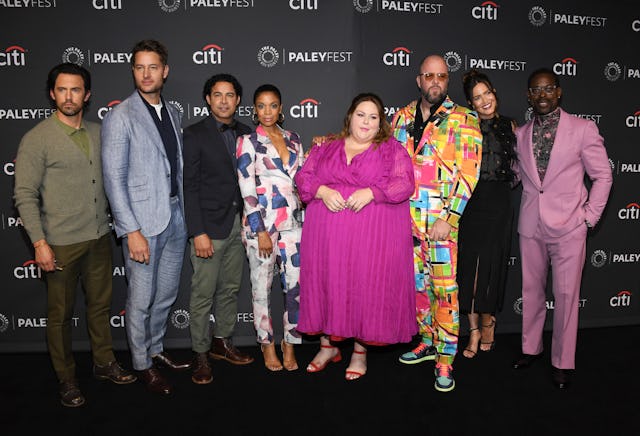What The ‘This Is Us’ Cast Can Teach Us About Fighting For Equal Pay
“We regard ourselves as a family,’ Mandy Moore explains.

This weekend, the cast of ‘This Is Us’ took a break from wrapping up filming the final season of their immensely popular television show to participate in a lively discussion at PaleyFest L.A. — and they had some touching and wise things to say about how people can fight for equal pay.
The show’s leads were all there — Milo Ventimiglia, Mandy Moore, Sterling K. Brown, Chrissy Metz, Justin Hartley, Susan Kelechi Watson, Chris Sullivan, and Jon Huertas — and seeing them together as actors is just as fun and inspiring as seeing them playing their characters on screen.
The cast covered all sorts of topics over their hour-long chat, but the most moving moments came when they discussed how they approached equal pay. After an initial season of earning different amounts, the main crew of Ventimiglia, Moore, Brown, Metz, Hartley, Watson and Sullivan demanded equal pay for the second season and were granted $250,000 per episode moving forward. They’ve since all received the same amount — a huge accomplishment considering the gender pay gap in Hollywood.
“I think when it comes to all things with us, we are not just a group of actors working together, but we regard ourselves as a family,” Moore said. “And so in the matters of life, and love, and business, and everything in between, I feel that we were always going to stick together. It wouldn’t feel right to do it any other way.”
“This truly is an ensemble show. Some of us have been around in our careers longer than others, but we are all a part of the same show,” Ventimiglia agreed. “There’s not one character that is more important than the next, so I think for us it was important to make sure that we are looking out for one another creatively, but also in business. Sometimes there is an understanding that maybe one person may bring in more eyeballs, and that would get a monetary value attached to it. Or if someone has been in Hollywood for a long time, that they are worthy of more. It’s tough, but with our ensemble show, everybody is worthy and equal.”
The cast asked for a bonus ahead of the sixth season, a well-deserved ask considering the show’s wide-spread popularly and acclaim, not to mention 38 Emmy nominations and counting. But while the seven original main characters received a reported $2 million bonus, Huertas (who became a regular in Season 2) was offered $1 million. When the group complained together as a group, the studio was unrelenting. But still, the cast offered Huertas parts of their bonus to maintain parity among the group.
“It was a gift that these guys wanted to stand up for me,” said Huertas. “It comes down to that sense of family. Every person in this cast, we are members of the same family now. We’ve had these conversations and made a pact with one another to always support one another and stand up for one another. We’ve had that outright conversation saying, ‘Anything you want me to change, let’s just be honest with one another.’ We’ve been like that from the beginning.”
It’s seems to be such a great working model to move workplaces closer to equal pay: transparency, support, empathy, and not leaving anyone behind.
“We get to do everything together. It’s not about one individual, it’s about us,” said Brown.
As for the show, the sixth season of the family drama is coming to a close this spring, with the final episode airing on May 24 on NBC. If you’re afraid the show won’t continue to have audiences weeping and gasping as the others have, don’t worry.
“The second-to-last script I sent out to the cast made Mandy throw up,” said series creator Dan Fogelman.
“It was so beautiful and upsetting that that was my physical reaction,” Moore responded.
“I couldn’t breathe,” Metz said of the same episode. “I couldn’t catch my breath. My nose was completely stuffed.”
And you can enjoy the show even more knowing that all of the main players you see on screen are getting paid fairly — and have each other’s backs.